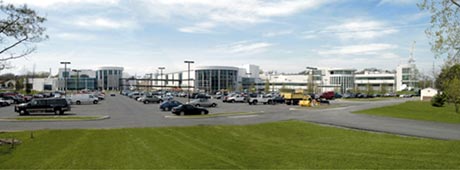NEW YORK SPOTLIGHT
Location Firms Up Another Hudson Valley Mattress Deal

|
| AlbanyNanotech, a research and development institution at the University of Albany-SUNY, is a catalyst for the burgeoning nanotechnology industry. The ambitious program has already helped attract and create about 20 companies. |
| T |
he highly competitive U.S. mattress business, relatively secure from foreign competition, is thriving. Increased business has put Serta and its manufacturing arm, National Bedding, in an expansion mode.
Looking for a prime location to better serve the lucrative and fast growing Northeast market, Serta considered sites in New York and Pennsylvania before lighting in the Hudson Valley town of New Baltimore, N.Y., about 25 miles (40 km.) south of Albany. When the search began, Serta was looking for a new or existing facility, but elected to build its own US$11.25 million, 233,000-sq.-ft. (21,600-sq.-m.) facility on a 16-acre (6.5-hectare) site in the Kalkberg Commerce Park.
Andy Cuppia, Serta's vice president of operations, says the facility is a departure from a previous philosophy of building smaller plants. The New Baltimore plant, along with a similarly sized Serta operation set to open early this year in Ontario, Calif., will be the company's largest.
Cuppia says Serta did not employ a site consultant in its search. All the due diligence
was done by company ownership and management. Three sites were seriously considered, he says.
"A location in the Northeast with good access to all points in the Northeast was the main consideration," Cuppia says. The site lies less than a mile from I-87, a primary north-south highway corridor.
The market is so good for Serta that the company quickly launched temporary manufacturing operations in a facility near its eventual plant site. By December 2004, the company had 35 people working, a number that will steadily grow as employees are trained and the new facility progresses. Construction of the new plant will likely begin in April 2005 and will take six to eight months, Cuppia says. At full capacity, the plant will employ about 250 and will produce 2,500 to 3,000 mattresses per day. Wages will range from $12 to $15 per hour. Training periods range from four to 16 weeks depending on the job.
"We want to go into the new building with the nucleus of a trained work force," Cuppia says. "The Northeast is a competitive and very high-volume market because of the density of population. We perceived the area as having a good work force and we were impressed with the work that the county development authority [Greene County Industrial Development Agency] did."
Nearby Albany County recently saw the February 2004 launch of a $25-million, 257,000-sq.-ft. (23,875-sq.-m.) new plant from Serta rival Sealy.
Serta has served the Northeast from several manufacturing sites, including Boston and Linden, N.J. The company has announced the closure of the Linden plant. The New Baltimore site has room for expansion, but Cuppia says if demand reaches certain levels, the company may opt for another new plant to serve the region.
Looking for a prime location to better serve the lucrative and fast growing Northeast market, Serta considered sites in New York and Pennsylvania before lighting in the Hudson Valley town of New Baltimore, N.Y., about 25 miles (40 km.) south of Albany. When the search began, Serta was looking for a new or existing facility, but elected to build its own US$11.25 million, 233,000-sq.-ft. (21,600-sq.-m.) facility on a 16-acre (6.5-hectare) site in the Kalkberg Commerce Park.
Andy Cuppia, Serta's vice president of operations, says the facility is a departure from a previous philosophy of building smaller plants. The New Baltimore plant, along with a similarly sized Serta operation set to open early this year in Ontario, Calif., will be the company's largest.
Cuppia says Serta did not employ a site consultant in its search. All the due diligence
|
"A location in the Northeast with good access to all points in the Northeast was the main consideration," Cuppia says. The site lies less than a mile from I-87, a primary north-south highway corridor.
The market is so good for Serta that the company quickly launched temporary manufacturing operations in a facility near its eventual plant site. By December 2004, the company had 35 people working, a number that will steadily grow as employees are trained and the new facility progresses. Construction of the new plant will likely begin in April 2005 and will take six to eight months, Cuppia says. At full capacity, the plant will employ about 250 and will produce 2,500 to 3,000 mattresses per day. Wages will range from $12 to $15 per hour. Training periods range from four to 16 weeks depending on the job.
"We want to go into the new building with the nucleus of a trained work force," Cuppia says. "The Northeast is a competitive and very high-volume market because of the density of population. We perceived the area as having a good work force and we were impressed with the work that the county development authority [Greene County Industrial Development Agency] did."
Nearby Albany County recently saw the February 2004 launch of a $25-million, 257,000-sq.-ft. (23,875-sq.-m.) new plant from Serta rival Sealy.
Serta has served the Northeast from several manufacturing sites, including Boston and Linden, N.J. The company has announced the closure of the Linden plant. The New Baltimore site has room for expansion, but Cuppia says if demand reaches certain levels, the company may opt for another new plant to serve the region.


